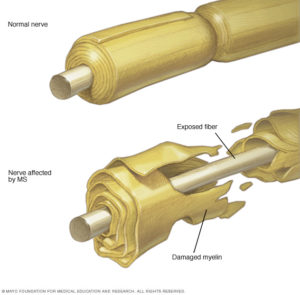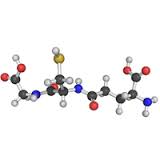 According to the Mayo Clinic, “Multiple sclerosis (MS) is a potentially disabling disease of the brain and spinal cord (central nervous system). In MS, the immune system attacks the protective sheath (myelin) that covers nerve fibers and causes communication problems between your brain and the rest of your body. Eventually, the disease can cause the nerves themselves to deteriorate or become permanently damaged.”
According to the Mayo Clinic, “Multiple sclerosis (MS) is a potentially disabling disease of the brain and spinal cord (central nervous system). In MS, the immune system attacks the protective sheath (myelin) that covers nerve fibers and causes communication problems between your brain and the rest of your body. Eventually, the disease can cause the nerves themselves to deteriorate or become permanently damaged.”
The MS Society of Canada says that this country has the highest incidence of MS in the world. From Statistics Canada we learn that about 1 in every 350 people has been diagnosed with MS. That is a disturbing number.
Despite decades of research, the cause remains a mystery. Current evidence suggests that lifestyle, environmental, genetic and biological factors may all contribute. MS is unpredictable and can result in symptoms such as extreme fatigue, lack of coordination, weakness, tingling, impaired sensation, vision problems, bladder problems, cognitive impairment and mood changes.
Because there is no known cure, treatments tend to focus on speeding recovery from attacks, slowing the progression of the disease and managing MS symptoms. Different drugs are used to address different specific symptoms. For example, as with asthma the problematic inflammation is treated with corticosteroids. But there is nothing to treat the disease as a whole.
What is known for certain is that all forms of MS are associated with oxidative stress. You can verify this by referencing PubMed. There is a 100% correlation. To confirm this, go to PubMed and search for ‘multiple sclerosis glutathione’ and you will be presented with a list of hundreds of published papers. Each one will identify low levels of glutathione, which correlates to high levels of oxidative stress. Oxidative stress means that the body has more free radicals than it has antioxidants to neutralize them. Free radicals cause harm to the body and produce cellular inflammation.
In a research paper published in February of 2011 entitled “Radical changes in multiple sclerosis pathogenesis” the authors state that “ROS [Reactive Oxygen Species – aka ‘free radicals’] initiate extensive cellular damage and tissue injury. ROS have been implicated in the progression of cancer, cardiovascular disease and neurodegenerative and neuroinflammatory disorders, such as multiple sclerosis (MS).” (Reference 1) The paper goes on to discuss clinical and experimental studies highlighting the therapeutic potential of antioxidant protection in the pathogenesis of MS.
There is some anecdotal evidence claiming that dramatically increasing the body’s intracellular glutathione levels can result in reduction of symptoms. (Glutathione is the body’s master antioxidant.) Instances of healing of some lesions has also been reported. And this may be supported by the fact that glutathione is needed for myelination, the creation of myelin sheaths to protect nerve fibres. But the problem with scattered anecdotal reports, despite the credentials of the neurologist involved, is that these do not carry the weight of formal controlled clinical studies. A few single reports of success do not provide sufficient data to form a generalization in which the medical community can have confidence. Clearly formal studies of this nature need to be initiated.
So if you have Multiple Sclerosis, what can you do in addition to following your doctor’s recommendations? There are a couple of suggestions I would offer.
These suggestions are based on a few facts. If you have MS your body is experiencing oxidative stress. Prolonged periods of oxidative stress result in your health deteriorating. You could develop a variety of chronic ailments from heart disease to glaucoma to cancer. The only open question is the rate at which your health will deteriorate. If you want to change this reality you need to address the oxidative stress.
- First, pay attention to your diet and lifestyle to look for changes you can make that will reduce the volume of free radicals produced in your body (e.g., quit smoking, eliminate processed meat from your diet, reduce your exposure to environmental toxins).
- Second, increase the levels of antioxidants in your body to deal with the free radical load. Increasing the antioxidants you ingest is a good start. But by far the most effective way is to increase your body’s production of glutathione in the cells. (Refer to the article Get Rid of the Radicals!)
Finally, push for clinical trials that examine the benefits of antioxidants as a treatment regimen.
#multiplesclerosis #glutathione #antioxidants
Reference 1: Molecular Basis of Multiple Sclerosis, Biochimica et Biophysica Acta (BBA) – Molecular Basis of Disease, Volume 1812, Issue 2, Pages 131-282 (February 2011)
